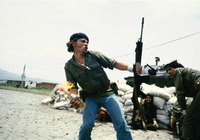2:00-4:00p.m.
Room 710 Social Sciences
Presented by Paula Cuellar, 2014-2015 Badzin Fellow in Holocaust & Genocide Studies

From the dictatorships of the Southern Cone to the civil wars that took place in Central America, the selected films will provide a lens into the systematic and widespread human rights violations that were perpetrated by state authorities during the last decades of the past century. By depicting the different situations lived in Argentina, Chile, Peru, Guatemala, El Salvador, the viewers will be able to explore the darkest moments of the history of Latin America in the twentieth century through the arts. In addition to the films we will have discussions on the different implications that the particular forms of violence had for every country.
Friday, October 10: The Official Story (Argentina, 1985): The film deals with the story of an upper middle class couple who lives in Buenos Aires with an illegally adopted child. The mother comes to realize that her daughter may be the child of a desaparecido, a victim of the forced disappearances that occurred during Argentina's last military dictatorship. Director: Luis Puenzo.
Friday, October 17: Death and the Maiden (Chile, 1994): Paulina is a housewife married to a prominent lawyer in an unnamed South American country. One day a storm forces her husband Gerardo to ride home with a charming stranger. She is convinced that the stranger, Doctor Miranda, was part of the old fascist regime and that he tortured and raped her for weeks while she was blindfolded. Paulina takes him captive to determine the truth. Director: Roman Polanski.
Friday, October 24: The Fall of Fujimori (Peru, 2005): The Fall of Fujimori is a character-driven, political-thriller documentary that explores the volatile events that defined Alberto Fujimori's decade-long reign of Peru. In 2000 he fled the country for Japan to avoid facing 21 charges of corruption, murder and human rights abuses. Then, five years later, Fujimori flew into Chile and declared his intention of once again running for president in 2006. This is his story. Director: Ellen Perry.
Friday, October 31: When The Mountains Tremble (Guatemala, 1983): Documentary film produced by Skylight Pictures about the war between the Guatemalan Military and the Mayan Indigenous population of Guatemala. It narrates the story of the Guatemalan people at large, specifically the struggles of the poor and peaceful Indian population that came to be labeled "subversives" by a draconian government. Director: Pamela Yates.
Friday, November 7: Monseñor: The Last Journey of Óscar Romero (El Salvador, 2011) In the 1970s, as El Salvador moved irrevocably closer to civil war, one man was known as the voice of the poor, the disenfranchised, the disappeared. Appointed Archbishop in 1977, Monseñor Oscar Romero worked tirelessly for peace, justice and human rights, while in constant personal peril. Using the power of the pulpit to denounce official corruption, he inspired millions with his nationally broadcast sermons, until in March of 1980; he was shot dead at the altar. Directors: Ana Carrigan and Juliet Weber.
Friday, November 14: Pictures from a Revolution (Nicaragua, 1991): In this lively, intellectually stimulating discourse on the power of images, a renowned photojournalist returns to the scenes of a revolution she witnessed and captured with her camera. Delving into the lives of guerrillas, Sandinistas, and bystanders, scattered from Miami to Managua, a decade after they faced off in a bloody struggle, this artful film finds both disappointment and modest pride amidst still fresh, stirring memories. Director: Susan Meiselas.
For more information please contact Paula Cuellar at cuell020@umn.edu.
Paula Cuellar is the 2014-2015 Badzin Fellow in Holocaust and Genocide Studies and is currently working towards a minor in Human Rights and an advanced degree in History at the University of Minnesota. Her research focuses on genocide of indigenous people in El Salvador and Paraguay in the 20th century. Cuellar's academic education includes a LL.B. Degree from the Central American University "José Simeón Cañas," a Master´s Degree in Human Rights and Education for Peace from the University of El Salvador and a LL.M. Degree in International Human Rights Law from Notre Dame. She also has a Postgraduate Diploma on Human Rights and Democratization´s Processes from the University of Chile and several diplomas on constitutional law and transitional justice courses.